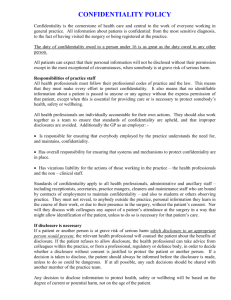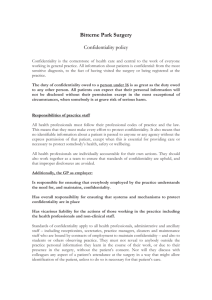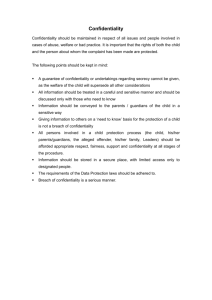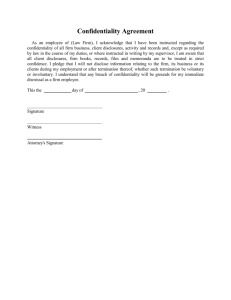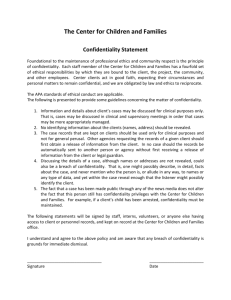Confidentiality
advertisement
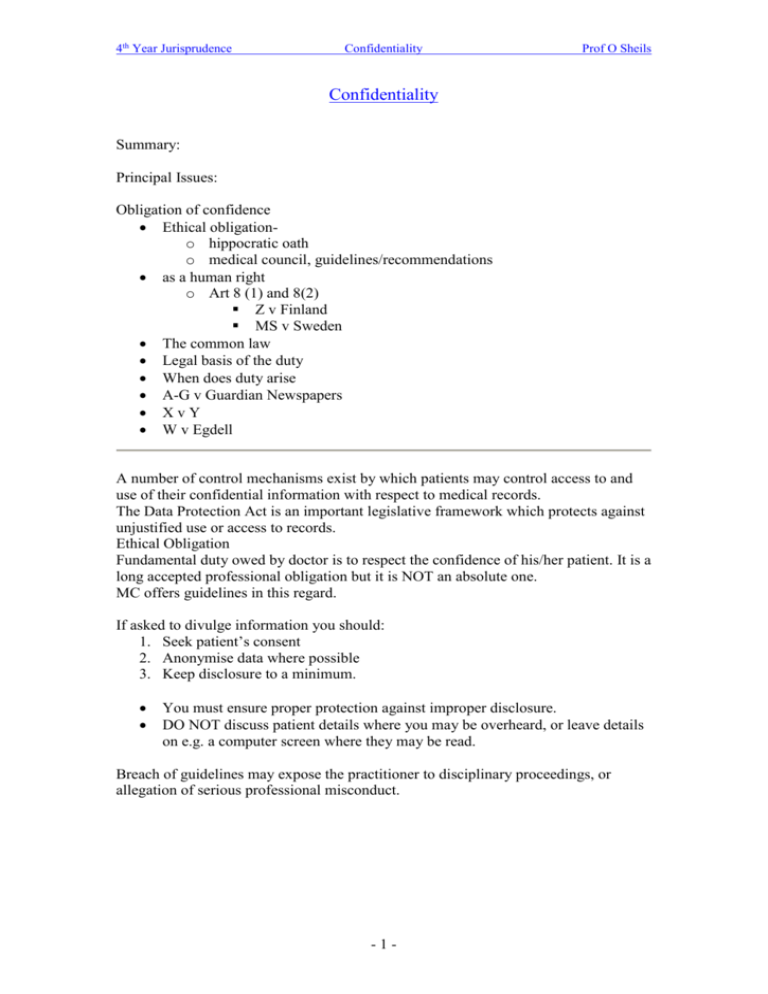
4th Year Jurisprudence Confidentiality Prof O Sheils Confidentiality Summary: Principal Issues: Obligation of confidence Ethical obligationo hippocratic oath o medical council, guidelines/recommendations as a human right o Art 8 (1) and 8(2) Z v Finland MS v Sweden The common law Legal basis of the duty When does duty arise A-G v Guardian Newspapers XvY W v Egdell A number of control mechanisms exist by which patients may control access to and use of their confidential information with respect to medical records. The Data Protection Act is an important legislative framework which protects against unjustified use or access to records. Ethical Obligation Fundamental duty owed by doctor is to respect the confidence of his/her patient. It is a long accepted professional obligation but it is NOT an absolute one. MC offers guidelines in this regard. If asked to divulge information you should: 1. Seek patient’s consent 2. Anonymise data where possible 3. Keep disclosure to a minimum. You must ensure proper protection against improper disclosure. DO NOT discuss patient details where you may be overheard, or leave details on e.g. a computer screen where they may be read. Breach of guidelines may expose the practitioner to disciplinary proceedings, or allegation of serious professional misconduct. -1- 4th Year Jurisprudence Confidentiality Prof O Sheils ECHR Importance of confidentiality is protected and incorporated into convention. 2 recent decisions illustrate application of Article 8 (right to respect for private and family life). Z v Finland (1997) 25 ECHR 371 (ECtHR) Z – Swedish woman married to X whom she met in Africa. X was found to be HIV positive during investigation for a number of sexual offences. It was unclear if he was aware of his HIV status at the time the offences were committed. Z invoked her right under Finnish Law not to give evidence against her husband. Medical Records of X AND Z were seized X was convicted on 3 counts of manslaughter and 2 additional counts. During the case Z’s identity was revealed. She complained her Article 8 rights had been violated (a) obliging doctors to disclose her records (b) seizing the records (c) decision to limit confidentiality (d) disclosure of her identity She argued the ‘violation’ was (A) not necessary in a democratic society (B) Dispropoortionate – a. (conviction on 5 counts rather than 3 was unlikely to alter the sentence) b. Not necessary to disclose her identity Government argued Breach was necessary because of the serious nature of the crimes →proportionate Questions: Is the article engaged? Has it been breached? 8 (1) – yes it was breached Question Was the breach justified? Was it: In accordance with the law Pursuing a legitimate aim Necessary There was a legitimate aim – so seizure of records could be justified. THE illegitimate breach occurred with regard to disclosure of her name etc on the public record in 2002 – neither necessary not proportionate. -2- 4th Year Jurisprudence Confidentiality Prof O Sheils MS v Sweden Here Court was not concerned with disclosure for criminal proceedings , rather disclosure to a government agency adjudicating on social security entitlement. Patient with chronic back pain. Fell at work, looked for social welfare citing back pain from fall prevented her working. Here Disclosure WAS justified by Art 8(2) – given the safeguards imposed by Swedish Law on the receiver of the information. Applicant waived her right to confidentiality when SHE instigated proceedings. Need to protect the economic well-being of the country. Common Law basis (also Equity): A-G v Guardian Newspapers (No2) [1990] 1 AC 109, [1988]3 All Er 545. Lord Goff summarised the law: ‘…duty of confidence arises when confidential information comes to the knowledge of the confidant where he has notice or is held to have agreed that the information is confidential…’ Children: Re C, Re Z and Venebales Complications arise when a 3rd party (doctor) knows something about a child and the child doesn’t want the parents told. Is a duty of confidentiality owed to a child? Re C (a minor) (warship:medical treatment) (No 2) [1989]2 All ER 791 (CA) C.A considered whether to grant an injunction preventing disclosure of information regarding treatment of a severely disabled baby. Held per Nicholls LJ “… such information could not properly be disclosed by any of the individuals to the media…” Subsequently, in Re Z (a minor) (freedom of publication) [1995]4 All ER 961 (CA), Ward LJ referred to Re C and recognised further that a ‘waiver’ of the duty of confidentiality ‘was an aspect of parental responsibility which had to be exercised by parents in the child’s best interests’. Incompetent Adults Using a capacity approach it would seem no duty is owed. However, if a statusapproach were adopted whereby merely being a patient would be sufficient to merit being owed a duty of confidentiality. -3- 4th Year Jurisprudence Confidentiality Prof O Sheils Modification of the obligation: Legal duty of confidence is subject to exceptions. In W v Egdell [1990] the Court of Appeal held the obligation was not absolute. 3 exceptions: (A) Where patient has consented to disclosure (B) Compulsion by Law (C) Public Interest Public Interest- an important exception to the duty of confidentiality X v Y[1988] 2 All ER 648, (1987)3 BMLR 1 (QBD) Feb ’87 an employee of a Health Authority supplied a reporter with information from hospital records identifying 2 doctors as being HIV positive. Rose J. rightly characterised the Law’s concern with protection of confidences as being in the public interest. NOTE what is of interest to the public may not be in the public interest. Situations where public interest may be prayed in aid to justify disclosure: (1) Danger to health or safety of others (2) Prevention or detection of crime (3) Teaching, research and management. W v Egdell [1990]All ER 835, (1989) 4 BMLR 96(CA) W was detained in a secure hospital. (Previously he shot and killed 5 people and wounded 2 others). 10 years later he applied to tribunal for discharge. RMO supported his application. W’s solicitor instructed a psychiatrist (Egdell) to examine W. E opposed W’s transfer to another less secure facility. E disclosed his report to the hospital and encouraged a copy be sent to the Secretary of State. Dr E was found justified in his stance – in the public interest. WRT infected health care workers- doctor owes a duty of confidence to worker BUT disclosure may be necessary in the public interest to protect others. This also applies if there is a danger because of incompetence or ill health. -4-

